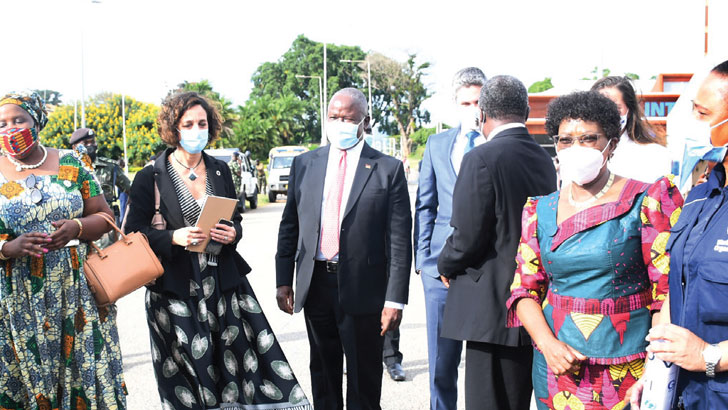Covid-19 laxity in border districts cause for worry
Health experts say the worrying Covid-19 statistics in border districts of Chitipa and Karonga should influence change in people’s mindset besides pushing Capital Hill to ensure health systems are in working order.
The two northern border districts are neighbours to Tanzania where the government is yet to start enforcement of Covid-19 precautionary measures. The laxity in the neighbouring country has made people in Karonga and Chitipa reluctant to follow Malawi’s Covid-19 precautionary measures.
Malawi has a case fatality rate of 3.3 percent while Chitipa District, with nine percent, is the worst after 22 people died out of 245 cases. Salima has the lowest case fatality rate at 1.1 percent with nine deaths from 799 cases.

masks at an official event
In Chitipa, health and council officials decry the continued resistance by people to follow Covid-19 rules due to their proximity to Tanzania where measures to fight the pandemic are not applied.
In an interview, Chitipa District Council chairperson Mercy Mpoha admitted that the district was a victim of misinformation on the pandemic due to its proximity to Tanzania; hence, the need for more civic education.
She said: “I have pleaded with them. The council has many programmes to help them understand this and I hope that with recent deaths and events in Tanzania, they may change their mind. But we are in serious problems, and we need more players to join us in educating the masses.”
In an earlier interview, Chitipa District director of health and social services Wilson Ching’ani lamented the misconceptions about Covid-19 in the district, calling for concerted efforts to end the same.
On his part , epidemiologist Dr Titus Divala said Chitipa and Karonga require serious funding and stepped-up efforts in dealing with the pandemic, acknowledging that border districts always have problems in following governmental measures.
He said: “Fund the districts well, don’t keep the money in Lilongwe, and make sure the health system in these districts is strong enough to respond to the virus on their own. The current differences in fatality rates are reflecting strengths of the health system in a particular area.
“If it is high in an area, most likely the health system is weak, yet district leadership is not doing enough or it is poorly funded and maybe the Covid-19 is not their priority. We also look at the behaviour of the population itself.”
In a separate interview, Society of Medical Doctors president Victor Mithi said the situation in the two districts should be a result of lack of clinical care, but also failure by people to follow the rules.
“By any means, there is need to ensure that the situation is changed. We need all districts to be at equal length with the pandemic at once,” he said., we have to all deal
Karonga District director of health and social services David Sibale admitted that not many people in the district were following the Covid-19 protocols.
“It’s 50-50. Some are adhering while others have relaxed. We will resume awareness campaigns once we have the funds because at the moment, we don’t. Currently, the awareness is there in static clinics, but not on a full-scale,” he said.
In an interview, Ministry of Health spokesperson Joshua Malango said government is working with several structures to ensure that people continue adhering to Covid-19 measures.
He said: “With the number of cases going down, people have started relaxing, but our plea is for all leaders to help and tell people that Covid-19 still exists and it kills.
“In border districts, people have to be responsible by reporting those who use uncharted routes and have been outside the country to health and security officials. People in the community know them. It starts with people changing their mindset






One Comment